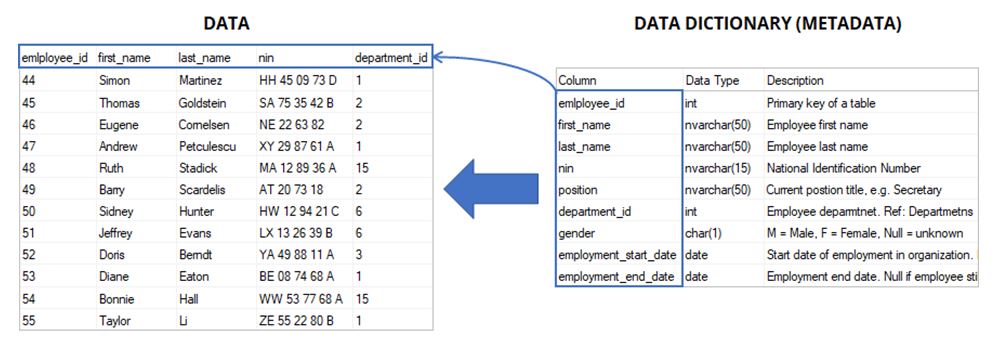Home »
DBMS
Data Dictionary in DBMS
DBMS Data Dictionary: In this tutorial, we will learn about the data dictionary and its types in the database management system (DBMS).
By Anushree Goswami Last updated : May 26, 2023
What is Data Dictionary in DBMS?
Data Dictionary can be defined as a DBMS component which stores the definition of characteristics of data and relationships. This "data about data" are labeled as metadata. Data Dictionary provides the DBMS with its self-describing characteristic.
Data Dictionary is the tool to help DBA to settle all the conflicts in the data.
If the data that are external to the DBMS and Data Dictionary can get organized to include them, it brings the flexibility for general corporate resource management. Thus, management of such extensive Data Dictionary gives the possibility to manage the organization information’s use and allocation, and it doesn’t matter that they belong to the database or not. This is the reason for the description of Data Dictionary as information resource dictionary and also the reason for so much use of Data Dictionary among the corporate industry.
If we talk about the metadata which is stored in the Data Dictionary often acts like a monitor that monitors the use of database and allocation of the rights to access the database by the users.

Features of Data Dictionary
Data Dictionary doesn't have any standard format to store the information. But there are some features that are common.
- Data Elements: Data Dictionary stores the definition of all the data elements. It stores name, data types, display formats, internal storage formats, and validation rules. It also explains the use of data, where an element gets used, who has used it and so on.
- Tables: Data Dictionary stores the name of the user who created the table, number of rows and columns, date at which table has been created and authorized access and so on.
- Index: Data Dictionary stores the Indexes that are defined for database tables. In every index, DBMS store index name used by the attributes, location, characteristics of the index and the date of creation.
- Programs: Data Dictionary stores the programs that are created to access database including report, application and screen format, SQL queries and so on.
- Relationship between data elements: Data Dictionary stores whether the relationship and compulsory or optional, cardinality and connectivity and so on.
- Administrations and End Users: Data Dictionary stores the information of all administrations and ends users as well.
Types of Data Dictionary
There are two main types of Data Dictionary in DBMS,
- Integrated Data Dictionary
- Stand Alone Data Dictionary
1) Integrated Data Dictionary
In DBMS, an integrated data dictionary is contained within the DBMS.
For e.g.: Every relational DBMSs includes an integral data dictionary or system catalog and it is often accessed and updated by RDBMS. Other than relational DBMS, the other entire DBMSs mainly old one doesn't include an integral data dictionary. So, as an alternative, DBA may use stand alone data dictionary systems.
Integrated Data Dictionary is further classified into two types:
- Active
In DBMS, an active data dictionary gets automatically updated by DBMS when every database access occurs, and thus it keeps each access information, up-to-date.
- Passive
In DBMS, a passive data dictionary does not getautomatically updated and often needs a batch method to run.
The access information of the Data Dictionary is mainly used for query optimization purpose by DBMS. The main function of the Data Dictionary is to store the report of all database objects. In DBMS, Integrated Data Dictionary has a tendency to bind their metadata into the data.
2) Stand Alone Data Dictionary
In DBMS, Stand alone data dictionary systems are typically more flexible than Integrated Data Dictionary and it permits DBA to define and manage all administration's data, doesn't matter whether the data are computerized or not.
Stand-alone provides designers of database and the end users with improvised ability to communicate with each other doesn't matter what is the format of Data Dictionary.